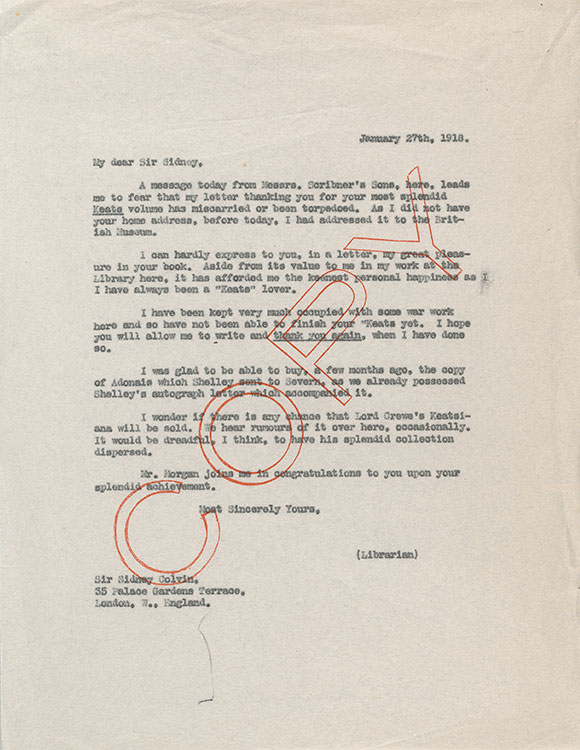
Though we do not have any commentary from Belle Greene about “On First Looking into Chapman’s Homer,” she does mention her purchase of Severn’s copy of Adonais. In a letter to Sidney Colvin offering congratulations for his 1917 Keats biography, Greene describes herself as a “'Keats' lover” and mentions purchasing Severn’s Adonais: “I was glad to be able to buy, a few months ago, the copy of Adonais which Shelley sent to Severn, as we already possessed Shelley’s autograph letter which accompanied it.” Greene’s acquisition effectively reunited the two objects, showing once again her deep knowledge of the collection and keen sense for how to develop its various strengths.
Of course, there were Keats manuscripts Greene was not able to secure for the Library. J. Pierpont Morgan declined a set of letters offered in 1911 by the bookseller George H. Richmond; in a letter to A.J. Bowden, her contact at the firm, Greene expressed her disappointment that they were unable to make the acquisition: “I rather regret this, as I hoped we would wish to have them.” Again in 1912 Morgan declined a Keats letter, written to his brothers George and Tom in 1818, this time offered by the Minneapolis bookdealer Edmund D. Brooks. In her letter declining the offer Greene wrote, “I regret to say that Mr. Morgan is at present in a state of mind where he refuses to buy anything, and, for that reason, I cannot consider the purchase of your Keats letter. I think it extremely interesting and am sorry I cannot add it to this collection.”
But in other instances Greene and Morgan worked in lockstep, as in the case of their relationship with the writer and collector Annie Fields (1834–1915). Widow of the prominent publisher James T. Fields (1817–1881) and an important supporter of women writers in Boston, Annie Fields struck up a friendship with Belle Greene and Morgan and eventually offered her album of autograph poetry to the Library in 1909. In a 1910 letter Greene assures Fields that her “Book of Manuscripts … will have the place d’honneur in this Library, which I trust will last for all time.” The album included a fragment of Keats’s long narrative poem "Hyperion", the rest of which is held at the British Library.
Belle da Costa Greene, retained copy of typed letter to Sidney Colvin, 27 January 1918. ARC 1310. Archives of the Morgan Library & Museum.
